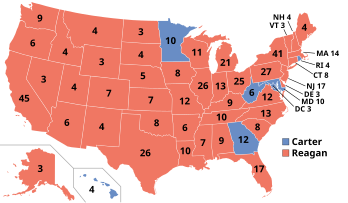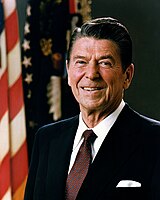
A | B | C | D | E | F | G | H | CH | I | J | K | L | M | N | O | P | Q | R | S | T | U | V | W | X | Y | Z | 0 | 1 | 2 | 3 | 4 | 5 | 6 | 7 | 8 | 9
| |||||||||||||||||||||||||||||||||||||
538 members of the Electoral College 270 electoral votes needed to win | |||||||||||||||||||||||||||||||||||||
|---|---|---|---|---|---|---|---|---|---|---|---|---|---|---|---|---|---|---|---|---|---|---|---|---|---|---|---|---|---|---|---|---|---|---|---|---|---|
| Turnout | 54.2%[1] | ||||||||||||||||||||||||||||||||||||
| |||||||||||||||||||||||||||||||||||||
 Presidential election results map. Red denotes states won by Reagan/Bush and blue denotes those won by Carter/Mondale. Numbers indicate electoral votes cast by each state. | |||||||||||||||||||||||||||||||||||||
| |||||||||||||||||||||||||||||||||||||
The 1980 United States presidential election was the 49th quadrennial presidential election, held on November 4, 1980. The Republican nominee, former California governor Ronald Reagan, defeated incumbent Democratic President Jimmy Carter in a landslide victory.
Carter's unpopularity and poor relations with Democratic leaders encouraged an unsuccessful intra-party challenge from Massachusetts Senator Ted Kennedy. Meanwhile, the Republican primaries were contested between former California Governor Ronald Reagan, former Central Intelligence Agency director George H. W. Bush, Illinois Representative John B. Anderson, and several other candidates. All of Reagan's opponents had dropped out by the end of the primaries, and the Republicans nominated a ticket consisting of Reagan and Bush. Anderson entered the general election as an independent candidate with Patrick Lucey, former Wisconsin governor, as his running mate.
Reagan campaigned for increased defense spending, supply-side economic policies, and a balanced budget. His campaign was aided by Democratic dissatisfaction with Carter, the Iran hostage crisis, and a worsening economy marred by stagflation. Carter attacked Reagan as a dangerous right-wing extremist, and warned that Reagan would cut Medicare and Social Security. The Carter campaign was aided early on by the rally 'round the flag effect from the hostage crisis, but as the crisis lasted to election day, it became a detriment.[2]
Reagan won the election in a landslide, with 489 Electoral College votes to Carter's 49 and 50.8% of the popular vote to Carter's 41.0%. Anderson won 6.6% of the popular vote and no electoral votes. Due to the rise of conservatism following Reagan's victory, historians have considered the election a political realignment that began with Barry Goldwater's presidential campaign in 1964. To date, this is the most recent election in which an incumbent Democratic president was not reelected and the only time that a Republican nominee defeated a Democratic incumbent in both the popular and the electoral vote.[3]
Background
Throughout the 1970s, the United States underwent a wrenching period of low economic growth, high inflation and interest rates, and intermittent energy crises.[4] By October 1978, Iran—a major oil supplier to the United States at the time—was experiencing a major uprising that severely damaged its oil infrastructure and greatly weakened its capability to produce oil.[5] In January 1979, shortly after Iran's leader Shah Mohammad Reza Pahlavi fled the country, Iranian opposition figure Ayatollah Ruhollah Khomeini ended his 14-year exile in France and returned to Iran to establish an Islamic Republic, largely hostile to American interests and influence in the country.[5] In the spring and summer of 1979, inflation was on the rise and various parts of the United States were experiencing energy shortages.[6]
Carter was widely blamed for the return of the long gas lines in the summer of 1979 that were last seen just after the 1973 Yom Kippur War. He planned on delivering his fifth major speech on energy, but he felt that the American people were no longer listening. Carter left for the presidential retreat of Camp David. "For more than a week, a veil of secrecy enveloped the proceedings. Dozens of prominent Democratic Party leaders—members of Congress, governors, labor leaders, academics and clergy—were summoned to the mountaintop retreat to confer with the beleaguered president." His pollster, Pat Caddell, told him that the American people simply faced a crisis of confidence because of the assassinations of John F. Kennedy, Robert F. Kennedy and Martin Luther King Jr.; the Vietnam War; and Watergate.[7] On July 15, 1979, Carter gave a nationally televised address in which he identified what he believed to be a "crisis of confidence" among the American people. This came to be known as his "Malaise speech", although Carter never used the word in the speech.[8]
Many expected Senator Ted Kennedy to successfully challenge Carter in the upcoming Democratic primary. Kennedy's official announcement was scheduled for early November. A television interview with Roger Mudd of CBS a few days before the announcement went badly, however. Kennedy gave an "incoherent and repetitive"[9] answer to the question of why he was running, and the polls, which showed him leading Carter by 58–25 in August now had him ahead 49–39.[10] Kennedy was also politically scarred by the 1969 Chappaquiddick incident;[11][12] the controversy had been a major reason for Kennedy's decision to not run for president in 1972 and 1976.[12]
Meanwhile, Carter was given an opportunity for political redemption when the Khomeini regime again gained public attention and allowed the taking of 52 American hostages by a group of Islamist students and militants at the U.S. embassy in Tehran on November 4, 1979. Carter's calm approach towards the handling of this crisis resulted in his approval ratings jump in the 60-percent range in some polls, due to a "rally round the flag" effect.[13]
By the beginning of the election campaign, the prolonged Iran hostage crisis had sharpened public perceptions of a national crisis.[14] On April 25, 1980, Carter's ability to use the hostage crisis to regain public acceptance eroded when his high risk attempt to rescue the hostages ended in disaster when eight servicemen were killed. The unsuccessful rescue attempt drew further skepticism towards his leadership skills.[15]
Following the failed rescue attempt, Carter took overwhelming blame for the Iran hostage crisis, in which the followers of the Ayatollah Khomeini burned American flags and chanted anti-American slogans, paraded the captured American hostages in public, and burned Carter in effigy. Carter's critics saw him as an inept leader who had failed to solve the worsening economic problems at home. His supporters defended the president as a decent, well-intentioned man being unfairly criticized for problems that had been escalating for years.[16]
When the Soviet Union invaded Afghanistan in late 1979, Carter seized international leadership in rallying opposition. He cut off American grain sales, which hurt Soviet consumers and annoyed American farmers. In terms of prestige, the Soviets were deeply hurt by the large-scale boycott of their 1980 Summer Olympics. Furthermore, Carter began secret support of the opposition forces in Afghanistan that successfully tied down the Soviet army for a decade. The effect was to end détente and reopen the Cold War.[17][18]
Nominations
Republican Party
| ||
|---|---|---|
|
Personal life 33rd Governor of California
40th President of the United States Legacy |
||
| ||
|---|---|---|
|
Pre-vice presidency
43rd Vice President of the United States 41st President of the United States
Policies
Appointments
Tenure
Presidential campaigns Vice presidential campaigns Post-presidency
 |
||








